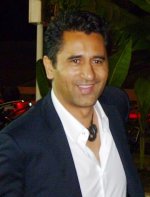CLIFF CURTIS- THE CIRCUS AND THE CELLULOID

By adamgreenwell
- 1031 reads
“There is a section where you quote about my swimming in the lake,soaking in the hot pools. Basically talking about my relationship with my ancestral land. What this land means to me seems impossible for me to describe in words.
One word that comes to mind is 'ukaipo' , which literally means 'breast feeding at night', but is often used when one speaks of one's special place in the world, one's source.
When I return to ukaipo I am replenished, I feel nurtured and a deep sense of serenity seems to flow through my veins. My mind becomes uncluttered and I am humbled, yet, I sense the importance of my being. My ancestors are in fact in this land that we live off. Another word is ' turangawaewae'. This speaks of the one sure place where one has the right to stand tall and strong.
On my marae is my ukaipo, turangawaewae, a place where everything around me affirms my unique heritage and ancestry. I know I belong there. Not because someone else told me- but because I feel it in the whole of my body to be true. With all of these things comes a responsibility, and often,times of conflict.
So it is not just a place of escape or sanctuary but also a place to wrestle with the realities of life.”
CLIFF CURTIS, New Zealand Actor. From Wrestling and Nestling by Adam Greenwell ( 2003: pp 131-132)
In 2002, while in Auckland, I watched the Arnold Schwarzenegger movie Collateral Damage, having spare time before a weekend retreat at a Franciscan friary there. That sounds a bit incongruous, I know. But I watched this film because the main villain was a Columbian terrorist, known as “The Wolf” played by New Zealand's own Cliff Curtis.
In 1995, the friars had kindly allowed me to live as their community while interviewing all of the Auckland-based subjects for my subsequent book Wrestling and Nestling, about New Zealand as seen by well-known New Zealanders. While there, I'd met Cliff at a nearby cafe in Mount Eden.
Cliff had just won an award for his role as Uncle Bully in the landmark New Zealand movie Once Were Warriors. Since our interview, he had gone on to star in a range of Hollywood movies where he seemed to be inevitably cast as a Latin or ethnic bad guy, opposite Hollywood big guns like Denzel Washington ( Training Day), Harrison Ford ( Six Days, Seven Nights), Johnny Depp (Blow) and Nicolas Cage (Bringing out the Dead ). Other Hollywood movies, however, showed Cliff's versatility, notably Three Kings, with George Clooney; Mark Wahlberg, and Ice Cube; The Majestic, starring Jim Carrey.
But it wasn't until Whale Rider - a consummate New Zealand film that saw Keisha Castle-Hughes become the youngest ever nominee in the Oscar for Best Actress category – that Cliff really shone out as an international actor in a leading role, playing the part of a man rediscovering his turangawaewae - a place to call his own.
I have followed Cliff's career with interest ever since I first met him on the playground at St Patrick's on the Kapiti Coast, back when I was nine. I was locally famous, if hearing “there's the boy who got his pants pulled down at the circus” everywhere you go counts as a prelude to stardom. Basically, four boys had been selected from a crowd at a recent circus to see who could best copy Charlie the Clown by standing on the back of a stallion as it trotted around the ring. As each of us fell off the horse, the clowns would give us a swing on the harness attached, so we'd go flying through the crowds. I won the grand prize of a dollar and a face painted in clown make up, but not before I flew around with my lily white butt exposed as one of the clowns gave the back of my shorts a tug.
Cliff, a little younger, never commented like the others. He'd just shout out a greeting, give me a big smile, and a long look beyond his years. Its strangely ironic that he seemed to admire me. And I think that admiration came from my short bare-bottomed circus flight. In a way, it presaged his support for those who put their lives, work, and bare backsides in full public view to foster people's understanding of one another.
ADAM GREENWELL- August 2008/Edited 2017
- Log in to post comments


